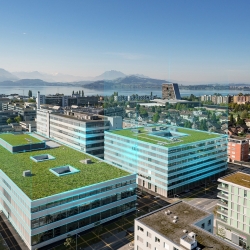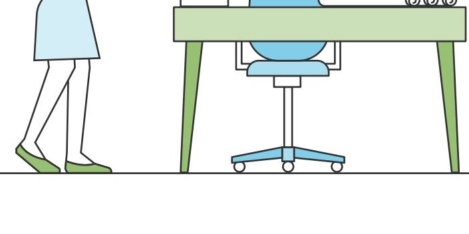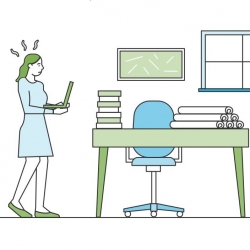June 18, 2021
Cities could be more important post-pandemic, not less, suggests report
 Paradoxically, more in-person work environments and the concentration of jobs in cities could be a medium- to long-term impact of the pandemic’s shift to remote working, suggests Citi GPS Technology at Work: The Coming of the Post-Production Society, a report produced by Citi and the Oxford Martin School at the University of Oxford. The report cites the automation of manufacturing and clerical tasks alongside the potential for professional services jobs that can be done remotely to be done cheaper overseas as the start of a foundational shift in developed economies. The future of work in these countries, it suggests, could be based largely on innovation, exploration and creative thinking which require face-to-face interaction and geographic proximity. (more…)
Paradoxically, more in-person work environments and the concentration of jobs in cities could be a medium- to long-term impact of the pandemic’s shift to remote working, suggests Citi GPS Technology at Work: The Coming of the Post-Production Society, a report produced by Citi and the Oxford Martin School at the University of Oxford. The report cites the automation of manufacturing and clerical tasks alongside the potential for professional services jobs that can be done remotely to be done cheaper overseas as the start of a foundational shift in developed economies. The future of work in these countries, it suggests, could be based largely on innovation, exploration and creative thinking which require face-to-face interaction and geographic proximity. (more…)









 Tens of thousands of restaurant, hotel, event and leisure jobs are available as England moves to the next step on the roadmap out of lockdown on Monday 17th May, but jobseeker shortages are making these jobs hard to fill, according to new research from global job search engine
Tens of thousands of restaurant, hotel, event and leisure jobs are available as England moves to the next step on the roadmap out of lockdown on Monday 17th May, but jobseeker shortages are making these jobs hard to fill, according to new research from global job search engine 
 Apple has announced an acceleration of its US investments, with plans to make new contributions of more than $430 billion and add 20,000 new jobs across the country over the next five years. The plans include the creation of a new
Apple has announced an acceleration of its US investments, with plans to make new contributions of more than $430 billion and add 20,000 new jobs across the country over the next five years. The plans include the creation of a new 




 Glint’s latest insights report shows that there is a worrying increase in employees experiencing challenges with their mental health, with burnout risk trending upwards year-over-year. That spiked in late March 2020 and climbed by nearly 4 percent between August and December 2020. That’s not a big surprise, given the first challenging months of the global pandemic. Paradoxically, employees say that despite feeling burnt-out, they also feel happier at work at the end of a year of lockdown than they did at the start. Is this some sort of contradiction—or evidence of something very encouraging about the state of HR?
Glint’s latest insights report shows that there is a worrying increase in employees experiencing challenges with their mental health, with burnout risk trending upwards year-over-year. That spiked in late March 2020 and climbed by nearly 4 percent between August and December 2020. That’s not a big surprise, given the first challenging months of the global pandemic. Paradoxically, employees say that despite feeling burnt-out, they also feel happier at work at the end of a year of lockdown than they did at the start. Is this some sort of contradiction—or evidence of something very encouraging about the state of HR? 
 Workers across the UK could return to offices faster than anticipated, according to a new RICS survey of facilities managers. According to the poll, a growing number of respondents say that up to 80 percent of employees will head back once the pandemic is resolved. This is up from less than 60 percent expected in the same poll from the previous quarter ending November 2020. As evidence suggests the UK vaccination programme is taking hold across the country, results to the
Workers across the UK could return to offices faster than anticipated, according to a new RICS survey of facilities managers. According to the poll, a growing number of respondents say that up to 80 percent of employees will head back once the pandemic is resolved. This is up from less than 60 percent expected in the same poll from the previous quarter ending November 2020. As evidence suggests the UK vaccination programme is taking hold across the country, results to the 
 Many organisations make bold claims about their zero carbon ambitions. Even if they don’t, most have sustainability statements. Yet the environmental impact of office furniture and sophisticated approaches to sustainable office design seem to be way down the ‘pecking order’. During the last year, we have read considerable commentary about the office – starting with its death but moving onto predictions of the ‘new dawn’ with more versatile and healthier workspaces.
Many organisations make bold claims about their zero carbon ambitions. Even if they don’t, most have sustainability statements. Yet the environmental impact of office furniture and sophisticated approaches to sustainable office design seem to be way down the ‘pecking order’. During the last year, we have read considerable commentary about the office – starting with its death but moving onto predictions of the ‘new dawn’ with more versatile and healthier workspaces. 
 Temporary moves boost creativity according to new research from
Temporary moves boost creativity according to new research from 
 Originally published in December 2014. Homeworking seems to have become a bit of a hot topic this year, but one sentence published on the
Originally published in December 2014. Homeworking seems to have become a bit of a hot topic this year, but one sentence published on the 
 An innovative little box that resembles a Rubik’s cube is making its way into corporate workspaces to assist facilities managers and HR teams gauge energy consumption and monitor the building’s efficiency, as well as track air quality, temperature and overall comfort of their physical surroundings. It’s all about better buildings. If individuals feel good in their workplace, they’re more likely to care about (and take care of) the buildings where they spend a large part of their days. And to ensure that the sample is truly representative, each individual can have a lightweight and portable
An innovative little box that resembles a Rubik’s cube is making its way into corporate workspaces to assist facilities managers and HR teams gauge energy consumption and monitor the building’s efficiency, as well as track air quality, temperature and overall comfort of their physical surroundings. It’s all about better buildings. If individuals feel good in their workplace, they’re more likely to care about (and take care of) the buildings where they spend a large part of their days. And to ensure that the sample is truly representative, each individual can have a lightweight and portable 








May 20, 2021
Is the time right for office furniture as a service?
by Joanna Knight • Comment, JK, Workplace design